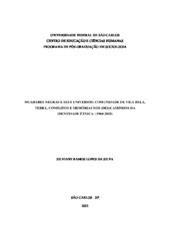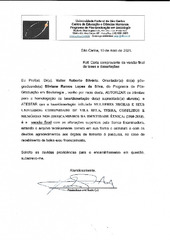Mostrar el registro sencillo del ítem
Mulheres negras e seus universos: comunidade de Vila Bela, terra, conflitos e memórias nos (des)caminhos da identidade étnica: (1960-2018)
| dc.contributor.author | Silva, Silviane Ramos Lopes da | |
| dc.date.accessioned | 2021-05-19T12:02:37Z | |
| dc.date.available | 2021-05-19T12:02:37Z | |
| dc.date.issued | 2021-03-19 | |
| dc.identifier.citation | SILVA, Silviane Ramos Lopes da. Mulheres negras e seus universos: comunidade de Vila Bela, terra, conflitos e memórias nos (des)caminhos da identidade étnica: (1960-2018). 2021. Tese (Doutorado em Sociologia) – Universidade Federal de São Carlos, São Carlos, 2021. Disponível em: https://repositorio.ufscar.br/handle/ufscar/14280. | * |
| dc.identifier.uri | https://repositorio.ufscar.br/handle/ufscar/14280 | |
| dc.description.abstract | This research moves to give visibility to the struggle to maintain the spaces, knowledge, and practices of an Afronative community, whose border territory is an area of conflict involving the ethnic-racial issues triggered, especially, by the expansion of the agricultural frontier in the Midwest region driven by national integration policies. Established as the headquarters of the Capitania of Mato Grosso, Vila Bela da Santíssima Trindade becomes a space for Blacks and Natives after the transfer of capital and departure of the elite to Cuiabá in the nineteenth century. With this change, the population that remained in the place constituted new relations and changes in the landscape. Given the return of White people (the “other”) to the city in the 1960s, transformations in the use of the territory and the way of life of residents redefine ethnic and symbolic boundaries, as well as resignification with the spaces. Considering that identity is reconstituted from differences, as fluid and fragmented, the Black women of Vila Bela fraternize with the Chiquitanas, appropriating the legacies left by their ancestors, and constitute the Afrochiquitania to resist the “other” who expropriated their lands and tries to occupy their spaces. In this context of conflicts, oppression, (re)constructions that this research intends to take, to try to understand the dynamics of overcoming the differences and inequalities experienced since the quilombola resistance of Tereza de Benguela, in the eighteenth century, until the contemporaneity in the daily anonymity experienced by the women of Vila Bela. Walking in the female “universe” with their stories and memories seeks to analyze what mechanisms these women use to ensure belonging to the place and reaffirm their ethnic identity. | eng |
| dc.description.sponsorship | Não recebi financiamento | por |
| dc.language.iso | por | por |
| dc.publisher | Universidade Federal de São Carlos | por |
| dc.rights | Attribution-NonCommercial-NoDerivs 3.0 Brazil | * |
| dc.rights.uri | http://creativecommons.org/licenses/by-nc-nd/3.0/br/ | * |
| dc.subject | Identidade | por |
| dc.subject | Fronteira | por |
| dc.subject | Territorialidade | por |
| dc.subject | Memória | por |
| dc.subject | Comunidade Quilombola | por |
| dc.subject | Identity | eng |
| dc.subject | Border | eng |
| dc.subject | Territoriality | eng |
| dc.subject | Memory | eng |
| dc.subject | Quilombola Community | eng |
| dc.title | Mulheres negras e seus universos: comunidade de Vila Bela, terra, conflitos e memórias nos (des)caminhos da identidade étnica: (1960-2018) | por |
| dc.title.alternative | Black women and their universes: Vila Bela community, land, conflicts and memories in the (dis) paths of ethnic identity: (1960-2018) | eng |
| dc.type | Tese | por |
| dc.contributor.advisor1 | Silvério, Valter Roberto | |
| dc.contributor.advisor1Lattes | http://lattes.cnpq.br/9421231847055027 | por |
| dc.contributor.advisor-co1 | Mancuso, Maria Inês Rauter | |
| dc.contributor.advisor-co1Lattes | http://lattes.cnpq.br/3208435983286140 | por |
| dc.description.resumo | A presente pesquisa movimenta-se no sentido de dar visibilidade à luta pela manutenção dos espaços, saberes e práticas de uma comunidade afronativa, cujo território fronteiriço é um espaço de conflitos envolvendo as questões étnico-raciais desencadeadas, sobremaneira, a partir da expansão da fronteira agrícola na região centro-oeste impulsionada pelas políticas nacionais de integração. Estabelecida como sede da Capitania de Mato Grosso, Vila Bela da Santíssima Trindade torna-se um espaço de negros e nativos após a transferência de capital e saída da elite para Cuiabá, no século XIX. Com essa mudança, a população que permaneceu no local constitui novas relações sociais e alterações na paisagem. Dado o retorno dos brancos (o “outro”) à cidade, na década de 1960, transformações no uso da terra e no modo de vida dos moradores redefinem as fronteiras étnicas e simbólicas, bem como a ressignificação em relação aos espaços. Considerando que a identidade se reconstitui a partir das diferenças, como algo fluido e fragmentado, as mulheres negras de Vila Bela irmanam-se com as Chiquitanas, apropriando-se dos legados deixados pelas ancestrais, e constituem a afrochiquitania para resistir diante o “outro” que expropriou suas terras e intenta ocupar seus espaços. Nesse contexto de conflitos, opressão, (re)construções que esta pesquisa pretende-se enveredar, para tentar compreender a dinâmica de superação ao enfrentamento das diferenças e desigualdades vivenciadas desde a resistência quilombola de Tereza de Benguela, no século XVIII, até a contemporaneidade no anonimato cotidiano experenciado pelas mulheres vilabelenses. Caminhando no “universo” feminino com suas histórias e memórias busca-se analisar que mecanismos essas mulheres utilizam para garantir a pertença do lugar e reafirmar a sua identidade étnica. | por |
| dc.publisher.initials | UFSCar | por |
| dc.publisher.program | Programa de Pós-Graduação em Sociologia - PPGS | por |
| dc.subject.cnpq | CIENCIAS HUMANAS::SOCIOLOGIA::OUTRAS SOCIOLOGIAS ESPECIFICAS | por |
| dc.subject.cnpq | CIENCIAS HUMANAS::SOCIOLOGIA::SOCIOLOGIA RURAL | por |
| dc.subject.cnpq | CIENCIAS HUMANAS::SOCIOLOGIA::SOCIOLOGIA URBANA | por |
| dc.publisher.address | Câmpus São Carlos | por |
| dc.contributor.authorlattes | http://lattes.cnpq.br/8967423014815132 | por |


